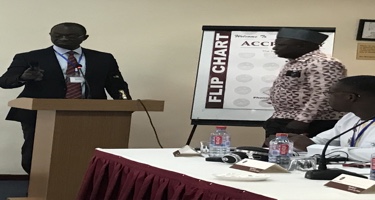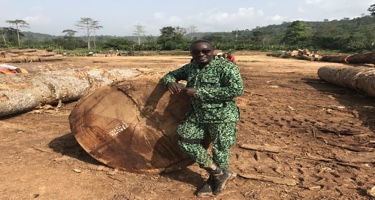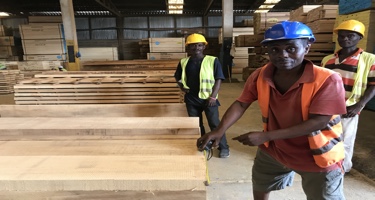
Ghana demonstrated its Wood Tracking System and other elements of its Timber Legality Assurance System (TLAS) to stakeholders from Republic of Congo (RoC) and Laos in a five-day event at the end of November. The multi-country information exchange included two conference days and a three-day field trip to the forest and timber processing companies in the Sefwi-Wiawso forest district in western Ghana.
Opening the first conference day, Chris Beeko, Director of the Ghana Forestry Commission (FC)’s Timber Validation Department (TVD), emphasized that the system in Ghana was rolled out and the country was ready for the final joint assessment of the VPA. Consultants have been selected and the Assessment is expected to begin early in 2019. “Ghana is seeing light at the end of the tunnel”, he said. “We are ready to start the Final Joint Assessment and are only waiting for the EC to commit to our readiness”.
Mr Beeko also pointed out the importance of VPA implementation for the Ghanaian timber industry, in spite of the loss of importance of Europe as a sales market over the last decade. “Roughly 60% of our exports used to go to Europe and now it is less than 20%”, he said. “But the VPA is still important as it has created a much better governance environment and is aligned with objectives of our forest and wildlife policy, such as effective law enforcement and sustainable forest management”.
Ghana’s WTS captures the entire supply chain
The Ghanaian Timber Legality Assurance System (TLAS) is based on an electronic wood tracking, verification of sales contracts and control of mills’ related timber inputs and outputs. Data is captured along the entire supply chain, updated in near-real time and infringements are flagged up automatically and, once flagged up, export licensing and product deliveries are paused until issues are resolved.
The Wood Tracking System (WTS) provides for positions of trees in the designated forest unit or compartment to be located by the global positioning system (GPS) and marked and numbered during an inventory of a demarcated forest area, as a result of which a digital stock map is created. Information on the digital map is not limited to tree numbers, but also includes information on timber species as well as trees’ height and width. Once a tree is felled, its details (number, species, volume, source) are first registered on a Tree Information Form and then, when ready for transport, re-entered on a Log Measurement and Conveyance Certificate (LMCC) with details of destination included. This LMCC accompanies the log all the way from the forest to the mill. The LMCC is not only available as a paper-based document, but also in the online WTS and will be checked upon arrival at the mill for species, dimensions and grade before adding to timber stock of the company. There will also be random roadside checks.
Registration of logged trees on the WTS as well as registration of arrival at sawmills is currently conducted by FC staff, as is the final physical inspection of containers to be shipped with FLEGT-licenses. Private companies do not (yet) have access to the WTS. Granting them access in the future is under consideration, according to Mr Beeko, but would require further capacity building and training.


Ghana FC explains how timber is traced to sawmills and beyond Workers preparing sawn timber for export
If a company wants to sell timber – both internationally and on the domestic market – it will have to sign a contract with the customer, which lays down details of the purchase. For exports, the company will then have to apply for a FLEGT license (Europe) or Export Permit (other export markets) with the Forestry Commission’s (FC) Timber Industry Development Division (TIDD). The application will have to be accompanied by the sales contract and relevant documentation, including a related log input/product output data sheet. This documentation will then be checked online by the Timber Validation Department (TVD/FC) and subsequently the FLEGT-license will be issued. For domestic sales, companies need to apply for a Domestic Timber Inspection Certificate (DOTIC); waybills, invoices and receipts for domestic sales will be linked to the DOTIC and thus be able to be traced.
According to Mr Beeko, Ghana has been testing these procedures and issuing “dummy FLEGT-licenses” since September 2018. According to IMM’s 2018 industry survey in Ghana, an area of improvement flagged up during this test process has been a time-lag in maintenance of the online WTS in some forest districts. Delays in uploading data on felling operations and log conveyance onto the computerised WTS have led to delays in issuance of dummy FLEGT-licenses in some instances. However, overall the processes are reportedly working well.
Third-party monitoring of control system
Once FLEGT licensing starts, there will be various bodies monitoring the system. An independent monitor will be commissioned to assess its overall the performance. Moreover, inside the Forestry Commission, the Timber Validation Committee (TVC) will oversee operations of the Timber Validation Department. Besides monitoring the work of the TVD, TVC will also be responsible for dealing with complaints from persons or organisations that feel negatively affected by the TLAS.
Domestic market reform progressing
“Reshaping governance structures takes more time than developing technical systems”, said Mr Beeko in response to a delegate’s question why Ghana still wasn’t issuing FLEGT-licenses, after 12 years of involvement in the FLEGT VPA process. For Ghana, he maintained, reforming a dual system of managing concessions has been one of the most significant challenges in the context of the VPA. However, a new Resource Management and Legality Licensing Regulation (LI 2254) entered into force in 2017. The new lawstipulates that concessions will be managed in the form of Timber Utilisation Contracts (TUCs); it also reforms conditions for becoming licensed for selling timber in Ghana or to export markets.
The new Law also makes provisions for small-scale TUCS to be granted to small companies, which is to improve access to legal timber for small companies that are currently frequently still operating informally. Representatives of the FC and Civil Society Organisations remarked that Ghana’s domestic market reform was making progress. Illegally harvested and sold timber still accounts for a significant proportion of domestically used wood. However, the proportion has been reduced from an estimated 70% two years ago to currently about 50%, with the VPA aiming to make also all domestic timber sales fully legal in the medium term.
The Civil Society Organisation Nature and Development Foundation offers training to support Small and Medium-Sized Enterprises (SMEs) in using legal timber when manufacturing products for the domestic market. Their experience was, a representative reported during the experience-sharing conference, that companies are beginning to take more interest in training and capacity building now that TVD has started auditing timber producers. Overall, especially small “one-man-managed” companies were still found to be in need of further capacity building and training. Companies should ideally also play a more active role in managing the legality assurance process, including data on the WTS, rather than relying on the FC to do the work for them, the organisation concluded.
